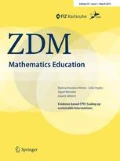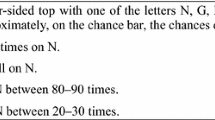Abstract
Knowledge shifts are essential in the learning process in the mathematics classroom. Our goal in this study is to better understand the mechanisms of such knowledge shifts, and the roles of the individuals (students and teacher) in realizing them. To achieve this goal, we combined two approaches/methodologies that are usually carried out separately: the Abstraction in Context approach with the RBC+C model commonly used for the analysis of processes of constructing knowledge by individuals and small groups of students; and the Documenting Collective Activity approach with its methodology commonly used for establishing normative ways of reasoning in classrooms. This combination revealed that some students functioned as “knowledge agents,” meaning that they were active in shifts of knowledge among individuals in a small group, or from one group to another, or from their group to the whole class or within the whole class. The analysis also showed that the teacher adopted the role of an orchestrator of the learning process and assumed responsibility for providing a learning environment that affords argumentation and interaction. This enables normative ways of reasoning to be established and enables students to be active and become knowledge agents.



Similar content being viewed by others
Notes
The letter A was missing in the drawing provided to the students.
References
Artigue, M., & Blomhøj, M. (2013). Conceptualizing inquiry-based education in mathematics. ZDM—The International Journal on Mathematics Education, 45(6), 797–810.
Boaler, J. (1998). Open and closed mathematics: Student experiences and understandings. Journal for Research in Mathematics Education, 29, 41–62.
Chapin, S., & O’Connor, C. (2007). Academically productive talk: Supporting student learning in mathematics. In W. G. Martin, M. Strutchens, & P. Elliot (Eds.), The learning of mathematics: 69th NCTM Yearbook (pp. 113–128). Reston, VA: National Council of Teachers of Mathematics.
Cobb, P., & Bauersfeld, H. (Eds.). (1995). The emergence of mathematical meaning: Interaction in classroom cultures. Hillsdale, NJ: LEA.
Cobb, P., Stephan, M., & Bowers, J. (2011). Introduction to Part IV, Chapter 8. In E. Yackel, K. Gravemeijer, & A. Sfard (Eds.), A journey in mathematics education research—insights from the work of Paul Cobb (pp. 109–116). New York: Springer.
Cobb, P., Stephan, M., McClain, K., & Gravemeijer, K. (2001). Participating in classroom mathematical practices. The Journal of the Learning Sciences, 10, 113–163.
Dooley, T. (2007). Construction of knowledge by primary pupils: The role of whole-class interaction. In D. Pitta-Pantazi & G. Philippou (Eds.), Proceedings of CERME 5 (pp. 1658–1668). Cyprus: Larnaca.
Dreyfus, T., Hershkowitz, R., & Schwarz, B. (2001). Abstraction in Context II: The case of peer interaction. Cognitive Science Quarterly, 1, 307–368.
Dreyfus, T., Hershkowitz, R., & Schwarz, B. (in press). The nested epistemic actions model for abstraction in context: theory as methodological tool and methodological tool as theory. In A. Bikner-Ahsbahs, C. Knipping, & N. Presmeg (Eds.), Doing (qualitative) research: Methodology and methods in mathematics education, Advances in Mathematics Education Series. Dordrecht: Springer.
Freudenthal, H. (1991). Revisiting mathematics education. Dordrecht: Kluwer.
Hershkowitz, R., Hadas, N., Dreyfus, T., & Schwarz, B. (2007). Processes of abstraction, from individuals’ constructing of knowledge to a group’s “shared knowledge”. Mathematics Education Research Journal, 19(2), 41–68.
Hershkowitz, R., Schwarz, B., & Dreyfus, T. (2001). Abstraction in context: Epistemic actions. Journal for Research in Mathematics Education, 32, 195–222.
Kidron, I. (2008). Abstraction and consolidation of the limit procept by means of instrumented schemes: The complementary role of three different frameworks. Educational Studies in Mathematics, 69, 197–216.
Lengnink, K. (2006). Reflected acting in mathematical learning processes. ZDM—The International Journal on Mathematics Education, 38, 341–349.
Monaghan, J., & Ozmantar, M. F. (2006). Abstraction and consolidation. Educational Studies in Mathematics, 62, 233–258.
O’Connor, C., Michaels, S., & Chapin, S. (in press). “Scaling down” to explore the role of talk in learning: From district intervention to controlled classroom study. In L. B. Resnick, C. Asterhan, & S. N. Clarke (Eds.), Socializing intelligence through talk and dialogue. Washington DC: American Educational Research Association.
Prediger, S., Bikner-Ahsbahs, A., & Arzarello, F. (2008). Networking strategies and methods for connecting theoretical approaches: first steps towards a conceptual framework. ZDM—The International Journal on Mathematics Education, 40, 165–178.
Rasmussen, C., & Stephan, M. (2008). A methodology for documenting collective activity. In A. E. Kelly, R. A. Lesh, & J. Y. Baek (Eds.), Handbook of innovative design research in science, technology, engineering, mathematics (STEM) education (pp. 195–215). New York, NY: Taylor and Francis.
Rasmussen, C., Stephan, M., & Allen, K. (2004). Classroom mathematical practices and gesturing. Journal of Mathematical Behavior, 23, 301–323.
Rasmussen, C., Zandieh, M., King, K., & Teppo, A. (2005). Advancing mathematical activity: A view of advanced mathematical thinking. Mathematical Thinking and Learning, 7, 51–73.
Ron, G., Dreyfus, T., & Hershkowitz, R. (2010). Partially correct constructs illuminate students’ inconsistent answers. Educational Studies in Mathematics, 75, 65–87.
Saxe, G. B., Gearhart, M., Shaughnessy, M., Earnest, D., Cremer, S., Sitabkhan, Y., et al. (2009). A methodological framework and empirical techniques for studying the travel of ideas in classroom communities. In B. B. Schwarz, T. Dreyfus, & R. Hershkowitz (Eds.), Transformation of knowledge through classroom interaction (pp. 203–222). London: Routledge.
Schwarz, B. B., Dreyfus, T., & Hershkowitz, R. (2009). The nested epistemic actions model for abstraction in context. In B. B. Schwarz, T. Dreyfus, & R. Hershkowitz (Eds.), Transformation of knowledge through classroom interaction (pp. 11–41). London: Routledge.
Stehlíková, N. (2003). Emergence of mathematical knowledge structures: introspection. In N. A. Pateman, B. J. Dougherty, & J. T. Zilliox (Eds.), Proceedings of the 27th International Conference for the Psychology of Mathematics Education (Vol. 4, pp. 251–258). Hono-lulu, HI: University of Hawaii.
Stein, M. K., Engle, R. A., Smith, M. S., & Hughes, E. K. (2008). Orchestrating productive mathematical discussions: Five practices for helping teachers move beyond show and tell. Mathematical Thinking and Learning, 10, 313–340.
Stephan, M., & Akyuz, D. (2012). A proposed instructional theory for integer addition and subtraction. Journal for Research in Mathematics Education, 43, 428–464.
Stephan, M., Bowers, J., Cobb, P., & Gravemeijer, K. (Eds.). (2003). Supporting students’ development of measuring conceptions: analyzing students’ learning in social context., Journal for Research in Mathematics Education Monograph No. 12 Reston, VA: National Council of Teachers of Mathematics.
Stephan, M., & Rasmussen, C. (2002). Classroom mathematical practices in differential equations. Journal of Mathematical Behavior, 21, 459–490.
Tabach, M., Hershkowitz, R., Rasmussen, C., & Dreyfus, T. (2014). Knowledge shifts in the classroom—a case study. Journal of Mathematical Behavior, 33, 192–208. doi:10.1016/j.jmathb.2013.12.001.
Toulmin, S. (1958). The uses of argument. Cambridge, UK: Cambridge University Press.
Treffers, A., & Goffree, F. (1985). Rational analysis of realistic mathematics education—the Wiskobas program. In L. Streefland (Ed.), Proceedings of the 9th International Conference for the Psychology of Mathematics Education (Vol. 2, pp. 97–121). Utrecht: OW&OC.
Voigt, J. (1995). Thematic patterns of interaction and sociomathematics norms. In P. Cobb & H. Bauersfeld (Eds.), Emergence of mathematical meaning: Interaction in classroom culture (pp. 163–201). Hillsdale, NJ: Lawrence Erlbaum.
Whitacre, I. (2012). Investigating number sense development in a mathematics content course for prospective elementary teachers. Unpublished Doctoral Dissertation, San Diego State University and University of California at San Diego.
Williams, G. (2002). Associations between mathematically insightful collaborative behaviour and positive affect. In A. Cockburn & E. Nardi (Eds.), Proceedings of the 26th Annual Conference of the International Group for the Psychology of Mathematics Education (Vol. 4, pp. 401–408). Norwich, UK: PME.
Wood, T., Williams, G., & McNeal, B. (2006). Children’s mathematical thinking in different classroom cultures. Journal for Research in Mathematics Education, 37, 222–255.
Author information
Authors and Affiliations
Corresponding author
Additional information
This study was partially supported by the Israel Science Foundation (Grant No. 1057/12).
Rights and permissions
About this article
Cite this article
Hershkowitz, R., Tabach, M., Rasmussen, C. et al. Knowledge shifts in a probability classroom: a case study coordinating two methodologies. ZDM Mathematics Education 46, 363–387 (2014). https://doi.org/10.1007/s11858-014-0576-0
Accepted:
Published:
Issue Date:
DOI: https://doi.org/10.1007/s11858-014-0576-0




